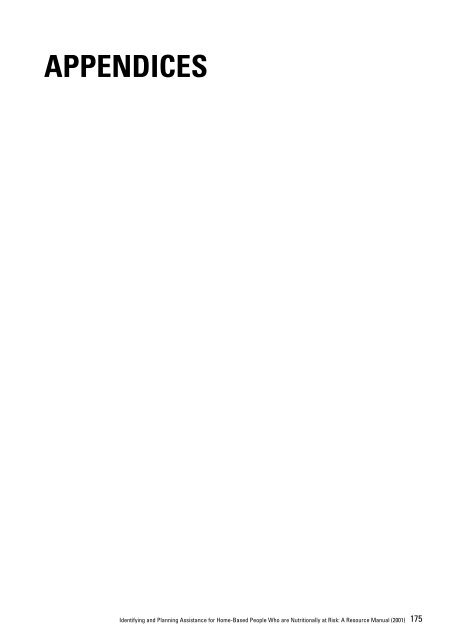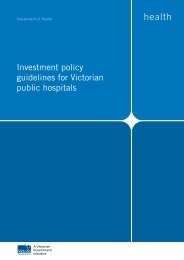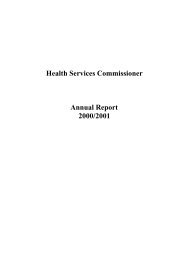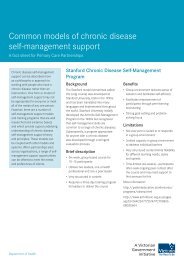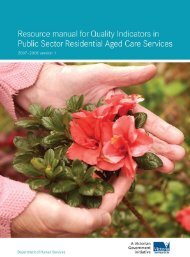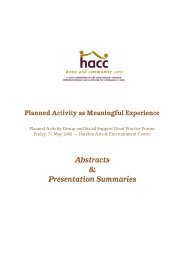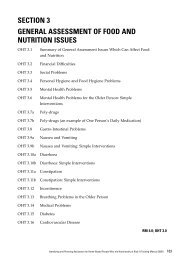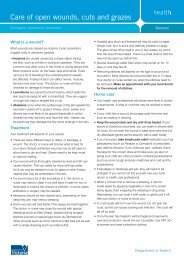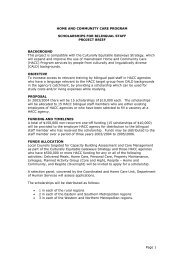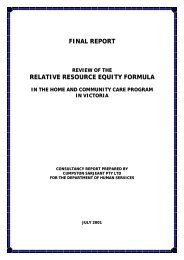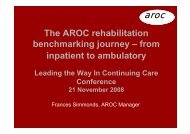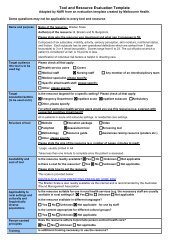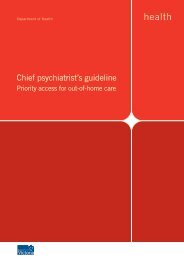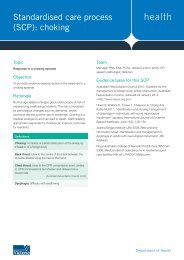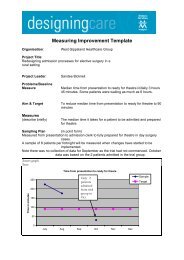Nutritional Risk - Appendix 1 to 4 (70kb, pdf) - Department of Health
Nutritional Risk - Appendix 1 to 4 (70kb, pdf) - Department of Health
Nutritional Risk - Appendix 1 to 4 (70kb, pdf) - Department of Health
You also want an ePaper? Increase the reach of your titles
YUMPU automatically turns print PDFs into web optimized ePapers that Google loves.
APPENDICES<br />
Identifying and Planning Assistance for Home-Based People Who are <strong>Nutritional</strong>ly at <strong>Risk</strong>: A Resource Manual (2001)<br />
175
APPENDIX 1: DEFINITIONS<br />
ACAT is the Aged Care Assessment Team. This is a Commonwealth <strong>Department</strong> <strong>of</strong> <strong>Health</strong> and<br />
Aged Care funded program which provides comprehensive assessment <strong>of</strong> a person’s ability <strong>to</strong><br />
perform their daily living activities, and information on residential options and in-home<br />
assistance available <strong>to</strong> the older person. These responsibilities include assessment for admission<br />
<strong>to</strong> government subsidised hostels, and nursing homes.<br />
Assessment is defined by the HACC Program as “A process by which consumers’ need for<br />
formal HSACC Services is evaluated. Assessment considers all the consumer needs and may<br />
involve an evaluation <strong>of</strong> other fac<strong>to</strong>rs, such as the availability <strong>of</strong> informal care and the<br />
consumer’s ability <strong>to</strong> pay where fees are charged for a service. Assessment is conducted in close<br />
consultation with the consumer” (Commonwealth <strong>of</strong> Australia, 1991).<br />
Assessment <strong>of</strong>ficers assess the needs <strong>of</strong> individuals in the HACC target group for community<br />
services, prepare individual care plans with them, and continue <strong>to</strong> advocate for the client as<br />
required.<br />
Community dietitians are usually employed by community health centres. They may work<br />
across all phases <strong>of</strong> the life cycle from infants <strong>to</strong> the older person, or they may be employed <strong>to</strong><br />
provide food, nutrition and dietetic services <strong>to</strong> particular population groups.<br />
Community services <strong>of</strong>ficers are assessment <strong>of</strong>ficers for Aged Services. These <strong>of</strong>ficers assess the<br />
needs <strong>of</strong> individuals in the target group for community services and prepare individual care<br />
plans with the client.<br />
DAA (Vic) is the Dietitians Association <strong>of</strong> Australia (Vic<strong>to</strong>rian Branch). The Dietitians Association<br />
<strong>of</strong> Australia (DAA) is the national body representing dietitians throughout Australia, with<br />
branches in all States and Terri<strong>to</strong>ries.<br />
DAA (Vic) Rehabilitation and Aged Care Special Interest Group This group is committed <strong>to</strong><br />
excellence <strong>of</strong> practice in food, nutrition and dietetics in the areas <strong>of</strong> rehabilitation, aged care and<br />
disability.<br />
Food issues are defined as client characteristics and problems which are related <strong>to</strong> client food<br />
needs.<br />
Food needs include those affected by client health and nutritional needs, their social needs<br />
(food range and variety, cultural and social fac<strong>to</strong>rs, and location <strong>of</strong> meals).<br />
HACC is the Home and Community Care Program funded by the Commonwealth <strong>Department</strong><br />
<strong>of</strong> <strong>Health</strong> and Aged Care and the Vic<strong>to</strong>rian <strong>Department</strong> <strong>of</strong> Human Services.<br />
HACC Dietitians are employed by a variety <strong>of</strong> organisations and are funded by HACC <strong>to</strong><br />
provide food, nutrition and dietetic services in the HACC Program.<br />
HACC service providers provide HACC Services with HACC funding, and include home carers,<br />
personal carers, district nurses, allied health pr<strong>of</strong>essionals in teams which are home-based,<br />
Linkages (case management), and social support Adult Day Activities (Services) (ADASS).<br />
HACC Subsidised Food Services are partly funded by the HACC program. Service providers<br />
receive $1.10 subsidy per meal and include local governments, hospitals and also nongovernment<br />
public and private organisations.<br />
Identifying and Planning Assistance for Home-Based People Who are <strong>Nutritional</strong>ly at <strong>Risk</strong>: A Resource Manual (2001)<br />
177
The HACC target population is defined in the Vic<strong>to</strong>rian HACC Program Manual (May 1998) as<br />
being: “frail older people, people with physical, functional, sensory, intellectual or psychiatric disabilities,<br />
people with aquired brain damage, carers and families living at home or in the community.” (p 10)<br />
Local dietitians may work with home based clients who are aged or who have a disability,<br />
without knowing that they are registered HACC clients. These dietitians may work in health<br />
and Community Care Agencies, hospitals, and/or in private practice.<br />
Nutrition issues are defined as client characteristics and problems which are related <strong>to</strong> their<br />
nutritional health needs.<br />
<strong>Nutritional</strong> needs <strong>of</strong> a client means the need for fluid, energy, and the macro- and micro-nutrients<br />
which are required by the client <strong>to</strong> support life itself and its daily phases <strong>of</strong> activity (sleeping,<br />
rest, and movement). These physiological needs increase during fever, illness and trauma, and are<br />
best provided in excess <strong>to</strong> correct for one or two days <strong>of</strong> poor or no food intake. <strong>Nutritional</strong> needs<br />
may be altered <strong>to</strong> treat and/or correct specific medical problems such as diabetes, and chronic<br />
obstructive airways disease.<br />
Nutrition counselling “provides individualised guidance on appropriate food and nutrient<br />
intakes, taking in<strong>to</strong> consideration health, cultural, socioeconomic, functional and psychological<br />
fac<strong>to</strong>rs. Nutrition counselling may include advice <strong>to</strong> increase or decrease nutrients in the diet,<br />
<strong>to</strong> change the timing, size or composition <strong>of</strong> meals, <strong>to</strong> modify food textures, and, in extreme<br />
instances, <strong>to</strong> change the route <strong>of</strong> administration” (Nutrition Screening Initiative, 1992).<br />
Nutrition education “imparts information about foods and nutrients, diets, lifestyle fac<strong>to</strong>rs,<br />
community nutrition resources and services <strong>to</strong> people <strong>to</strong> improve their nutritional status”<br />
(Nutrition Screening Initiative, 1992).<br />
<strong>Nutritional</strong> intervention “is an action taken <strong>to</strong> decrease the risk <strong>of</strong> or <strong>to</strong> treat poor nutritional status.<br />
(These actions) address the multi-fac<strong>to</strong>rial causes <strong>of</strong> nutritional problems and therefore include actions that<br />
may be taken by many different health and social service pr<strong>of</strong>essionals as well as family and community<br />
members. A wide range <strong>of</strong> intervention actions, from utilisation <strong>of</strong>...meal programs and home care services,<br />
<strong>to</strong> dental services and pharmacist advice, <strong>to</strong> nutrition education and nutrition counselling, <strong>to</strong> specialised<br />
medical and/or dietary treatment,... are all examples <strong>of</strong> nutritional interventions” (Nutrition Screening<br />
Initiative, 1992).<br />
<strong>Nutritional</strong> risk can be simply defined as “the risk <strong>of</strong> poor health for nutritional reasons”.<br />
A more complex and accurate definition has been provided: “The risk fac<strong>to</strong>rs <strong>of</strong> poor nutritional<br />
status are characteristics that are associated with an increased likelihood <strong>of</strong> poor nutritional<br />
status. They include the presence <strong>of</strong> various acute or chronic conditions or diseases, inadequate<br />
or inappropriate food intake, poverty, dependency or disability and chronic medication use.<br />
Indica<strong>to</strong>rs are generally quantitative and provide evidence that poor nutritional status is present”<br />
(Nutrition Screening Initiative, 1992).<br />
“<strong>Nutritional</strong> screening is the process <strong>of</strong> identifying characteristics known <strong>to</strong> be associated with<br />
dietary or nutritional problems. Its purpose is <strong>to</strong> differentiate individuals who are at high risk <strong>of</strong><br />
nutritional problems or who have poor nutritional status. For those with poor nutritional status,<br />
screening reveals the need for an in-depth nutrition assessment which may require medical<br />
diagnosis and treatment as well as nutrition counselling, as a specific component in a<br />
comprehensive health care plan” (Nutrition Screening Initiative, 1992).<br />
178<br />
Identifying and Planning Assistance for Home-Based People Who are <strong>Nutritional</strong>ly at <strong>Risk</strong>: A Resource Manual (2001)
APPENDIX 2: MORE INFORMATION ON HARM<br />
REDUCTION IN ALCOHOL ABUSE<br />
Practical guidelines<br />
1) Does the client use alcohol, <strong>to</strong>bacco, or drugs/sedatives (refer Section 5.5)?<br />
2) Identify the clients who are likely <strong>to</strong> incidentally withdraw from alcohol and seek advice.<br />
3) Expert advice is available through a 24 hour a day advisory service on alcohol and drugs<br />
(refer next page).<br />
Prevention <strong>of</strong> incidental alcohol withdrawal<br />
Alcohol withdrawal becomes apparent in the first 24-72 hours after cessation <strong>of</strong> continuous drug<br />
use or excessive recent use <strong>of</strong> the drug. It is during this period that incidental alcohol withdrawal<br />
can occur. Older adults most at risk include:<br />
1) Those who drink every day and have done so recently<br />
2) Those who undergo procedures, tests or operations within a few days, the effects <strong>of</strong> which<br />
can mask alcohol withdrawal, and<br />
3) Those who are treated with opiates (for example. pethidine) and other pain killers and<br />
sedatives (for example. benzodiazepines) which can mask alcohol withdrawal and delay its<br />
appearance.<br />
In a few individuals, alcohol withdrawal is so severe that it can cause difficult behaviour and<br />
perhaps result in serious injury <strong>to</strong> the person and bystanders or death from withdrawal<br />
complications.<br />
The prevention <strong>of</strong> incidental alcohol or drug withdrawal (in particular, alcohol withdrawal) is an<br />
important feature <strong>of</strong> good health care in all persons, regardless <strong>of</strong> their reason for presentation.<br />
Cessation <strong>of</strong> heavy drinking should not occur without medical supervision.<br />
Care <strong>of</strong> in<strong>to</strong>xicated adults<br />
*** NOTE: in<strong>to</strong>xication and alcohol/drug withdrawal can occur at the same time<br />
1) Overdose, in<strong>to</strong>xication identified<br />
a) Move the person in<strong>to</strong> a safe, quiet and supportive environment<br />
b) Consult a medical practitioner or expert (refer next page)<br />
2) Aggressive individuals<br />
a) Adopt a calm and quiet approach immediately<br />
b) Inform other staff<br />
3) Very violent individuals (rare)<br />
a) Inform nearby people<br />
b) Call the police immediately<br />
Identifying and Planning Assistance for Home-Based People Who are <strong>Nutritional</strong>ly at <strong>Risk</strong>: A Resource Manual (2001)<br />
179
ALCOHOL AND DRUG 24 HOUR ADVISORY SERVICES<br />
(VICTORIA)<br />
DACAS. Vic<strong>to</strong>rian Drug and Alcohol Clinical Advisory Service.<br />
Metropolitan areas Telephone: (03) (9416 3611).<br />
Country areas Telephone: (1800) (81 2804) (<strong>to</strong>ll free).<br />
DACAS is a 24-hour telephone service which provides health pr<strong>of</strong>essionals with advice on the clinical<br />
management <strong>of</strong> drug and alcohol issues.<br />
DIRECT LINE.<br />
Metropolitan areas Telephone: (03) (9416 1818).<br />
Country areas Telephone: (1800) (13 6385) (<strong>to</strong>ll free).<br />
Direct Line is a telephone service which provides anyone in the community (users and health<br />
pr<strong>of</strong>essionals) with access <strong>to</strong> services, counselling and information on drugs and alcohol.<br />
ALCOHOL AND DRUG ORGANISATIONS<br />
ADF (Australian Drug Foundation), Vic<strong>to</strong>ria<br />
409 King Street, WEST MELBOURNE 3003<br />
Telephone 03 9278 8100<br />
The ADF has an extensive library which provides resource and reference material <strong>to</strong> anyone, particularly<br />
health workers. There is a lengthy publication list <strong>of</strong> printed material, posters and videos. Call the Librarian<br />
<strong>to</strong> arrange access.<br />
ARBIAS (Alcohol Related Brain Injury Advisory Service)<br />
226 Gertrude Street (PO Box 213). FITZROY 3065<br />
Tel 03 9417 7071<br />
The aim <strong>of</strong> ARBIAS is <strong>to</strong> assist people disabled through alcohol or other substance related brain injury <strong>to</strong><br />
live and function <strong>to</strong> their full potential in the community. ARBIAS provides assessment, accommodation<br />
and support.<br />
TURNING POINT ALCOHOL AND DRUG CENTRE INC.<br />
54-62 Gertrude Street, FITZROY 3065<br />
Telephone 03 9254 8061; Fax 03 9416 3420<br />
Turning Point is a non-government organisation established <strong>to</strong> provide leadership in therapeutic<br />
innovation, research and evaluation, and education and training in the alcohol and drug sec<strong>to</strong>r in Vic<strong>to</strong>ria.<br />
It is affiliated with St Vincent’s Hospital and the University <strong>of</strong> Melbourne.<br />
VAADA (Vic<strong>to</strong>rian Alcohol and Drug Association)<br />
3 Alexander Parade, COLLINGWOOD 3066<br />
Telephone 03 9416 0899; Fax 03 9416 2085<br />
VAADA is the peak body for Vic<strong>to</strong>rian organisations and individuals with an interest in reducing the<br />
health economic and social consequences <strong>of</strong> the use <strong>of</strong> alcohol and other drugs. VAADA runs an annual<br />
conference.<br />
180<br />
Identifying and Planning Assistance for Home-Based People Who are <strong>Nutritional</strong>ly at <strong>Risk</strong>: A Resource Manual (2001)
APPENDIX 3: REFERENCES AND RESOURCES<br />
<strong>Nutritional</strong> <strong>Risk</strong> Screening and Moni<strong>to</strong>ring Project<br />
Publications and Materials<br />
Wood, B. 1996, Identifying and assisting people who are nutritionally at risk: Part I: Report, Dietitians<br />
Association <strong>of</strong> Australia (Vic<strong>to</strong>rian Branch), Melbourne.<br />
Wood, B. 1996, Identifying and assisting people who are nutritionally at risk Part II: Appendices,<br />
Dietitians Association <strong>of</strong> Australia (Vic<strong>to</strong>rian Branch), Melbourne.<br />
Wood, B. 1997 Identifying and assisting people who are nutritionally at risk. Second Report, Dietitians<br />
Association <strong>of</strong> Australia (Vic<strong>to</strong>rian Branch), Melbourne.<br />
Wood, B. 1997, Identifying and assisting people who are nutritionally at risk. Proceedings <strong>of</strong> the Dietitians<br />
Focus Group on Disability, 30th April and 1st May, 1997, Dietitians Association <strong>of</strong> Australia<br />
(Vic<strong>to</strong>rian Branch), Melbourne.<br />
Wood, B. 1997, Identifying and assisting people who are nutritionally at risk. Third Report, Dietitians<br />
Association <strong>of</strong> Australia (Vic<strong>to</strong>rian Branch), Melbourne.<br />
Wood, B., Bacon, J., Stewart, A. & Race, S. 2000, Identifying and Planning Assistance for Home-Based<br />
Adults who are <strong>Nutritional</strong>ly at <strong>Risk</strong>: A Resource Manual, Aged Care and Mental <strong>Health</strong> Division,<br />
Vic<strong>to</strong>rian Government <strong>Department</strong> <strong>of</strong> Human Services, Melbourne.<br />
Wood, B., Bacon, J., Stewart, A. & Race, S. 2000, Identifying and Planning Assistance for Home-Based<br />
Adults who are <strong>Nutritional</strong>ly at <strong>Risk</strong>: A Training Manual, Aged Care and Mental <strong>Health</strong> Division,<br />
Vic<strong>to</strong>rian Government <strong>Department</strong> <strong>of</strong> Human Services, Melbourne.<br />
Good Food and <strong>Health</strong> Advice for Older People Who Want <strong>to</strong> Help Themselves: An Information Booklet for<br />
Older People, Family and Carers 2000, Aged Care and Mental <strong>Health</strong> Division, Vic<strong>to</strong>rian<br />
Government <strong>Department</strong> <strong>of</strong> Human Services, Melbourne.<br />
General References<br />
American Dietetic Association 1993, ‘Dining skills. Practical interventions for the caregivers <strong>of</strong> the<br />
eating-disabled older adult’: American Dietetic Association, Chicago.<br />
Anon 1996, ‘Development <strong>of</strong> the Australian nutrition screening initiative’, Australian Journal on<br />
Ageing, vol. 15, no. 15.<br />
Bacon, J. 1995, ‘Famine in the midst <strong>of</strong> plenty: <strong>Nutritional</strong> status <strong>of</strong> the frail elderly’, Proceedings<br />
Nutrition Society, vol. 19, pp. 152-156.<br />
Baghurst, K., Hertzler, A., Record, S.J. & Spurr, C.1992, ‘The development <strong>of</strong> a simple dietary<br />
assessment and education <strong>to</strong>ol’, Journal <strong>of</strong> Nutrition Education vol. 24, pp. 65-72.<br />
Bryan, F., Jones, J.M., Russell, L.1998, ‘Reliability and validity <strong>of</strong> a nutrition screening <strong>to</strong>ol <strong>to</strong> be used<br />
with clients with learning difficulties’, Journal Human Nutrition and Dietetics vol. 11, pp. 41-50.<br />
Commonwealth <strong>Department</strong> <strong>of</strong> Human Services and <strong>Health</strong> 1995, ‘A world <strong>of</strong> food: A manual <strong>to</strong><br />
assist in the provision <strong>of</strong> culturally appropriate meals for older people’, AGPS, Canberra.<br />
Identifying and Planning Assistance for Home-Based People Who are <strong>Nutritional</strong>ly at <strong>Risk</strong>: A Resource Manual (2001)<br />
181
Commonwealth <strong>of</strong> Australia 1992, ‘HACC Program. National Guidelines’, AGPS, Canberra.<br />
Commonwealth <strong>of</strong> Australia, <strong>Department</strong> <strong>of</strong> Human Services and <strong>Health</strong>, Aged and Community<br />
Care Division 1995, ‘The efficiency and effectiveness review <strong>of</strong> the home and community care program.<br />
Final report’, AGPS, Canberra.<br />
Community Services Commission 1997, ‘Report on nutritional and mealtime practices for people<br />
with developmental disabilities in Residential Care’, Community Services Commission, Sydney.<br />
Dear, W. & Webb, Y. 1996, ‘The Nutrition Decision Tree’, Dear and Webb, PO Box 52, Newcastle.<br />
Haralambous, B. 1992, ‘Being elderly, being disabled and home care issues for people from non-English<br />
speaking backgrounds’, Inner West Migrant Resource Centre, Melbourne.<br />
Haralambous, B. 1992, ‘Caring for people from non-English speaking backgrounds, issues for carers’,<br />
Inner West Migrant Resource Centre, Melbourne.<br />
Hughes, A. & Alexander, L. 1995, ‘The HACC Program: Improving access for homeless people’,<br />
Royal District Nursing Service Homeless Persons Program, Melbourne.<br />
Hunwick, H. & Dear, W. 1997, ‘The Nutrition Project: A case study for screening, assessment and<br />
intervention’, West Sydney Intellectual Disability Support Group Inc, Epping, Sydney.<br />
Madden, R. & Hogan, T 1997, ‘The definition <strong>of</strong> disability in Australia: Moving <strong>to</strong>wards national<br />
consistency’, AIHW, Canberra.<br />
Migrant Resource Centre 1992, ‘Ethnic meals project and feasibility study’, Migrant Resource Centre,<br />
Melbourne.<br />
Nutrition Screening Initiative 1992, ‘The nutritional intervention manual for pr<strong>of</strong>essionals caring<br />
for older Americans’, Nutrition Screening Initiative, Washing<strong>to</strong>n DC.<br />
Pargeter, K. & Flint-Richter, D. 1991, ‘Home and Community Care Food Services Information Kit’,<br />
<strong>Department</strong> <strong>of</strong> <strong>Health</strong> and Community Services, Melbourne.<br />
Reynolds, A. McVicar, G. Rijneveld, L. & Macnaught, A-A. 1994, ‘Review <strong>of</strong> HACC Subsidised<br />
Food Services in Vic<strong>to</strong>ria. Report 1: HACC Subsidised Food Services: Key issues and options for future<br />
development’, McVicar & Reynolds Pty Ltd, Melbourne.<br />
Reynolds, A. McVicar, G. Rijneveld, L. & Macnaught, A-A. 1994, ‘Review <strong>of</strong> HACC Subsidised<br />
Food Services in Vic<strong>to</strong>ria. Report 2: Background Papers’, McVicar & Reynolds Pty Ltd, Melbourne.<br />
Stewart, A. 1993, ‘Nutrition for the elderly in the 1990s’, Nutridate, vol 4., pp1-5.<br />
West, R. & Tang, A. 1997, ‘Report on nutritional and mealtime practices for people with developmental<br />
disabilities in Residential Care’, Community Services Commission, Strawberry Hills, NSW.<br />
What is happening in ANSI. ‘The Australian nutrition screening initiative’, 1995 DAA Newsletter,<br />
May.<br />
Wood, B. Morrison, M. & Atkinson, M. 1998, ‘A Training Manual for Carers’, Ballarat <strong>Health</strong><br />
Services, Ballarat.<br />
Wood, B. Morrison, M. & Atkinson, M. 1998, A Resource Manual for Carers, Ballarat <strong>Health</strong><br />
Services, Ballarat.<br />
182<br />
Identifying and Planning Assistance for Home-Based People Who are <strong>Nutritional</strong>ly at <strong>Risk</strong>: A Resource Manual (2001)
Resources<br />
COOKING FOR ONE OR TWO<br />
Home Economics Institute <strong>of</strong> Australia (Vic) Inc.<br />
PO Box 143,<br />
CARLTON SOUTH 3053<br />
A small paperback recipe book.<br />
COOKING SMALL EATING WELL<br />
Hawthorn Community Education Project<br />
24 Wakefield Street<br />
HAWTHORN 3122<br />
Telephone: 03 9818 7371<br />
A practical program for community workers <strong>to</strong> assist older people <strong>to</strong> eat well.<br />
This program takes community workers through a one day demonstration and information package.<br />
The workers can then use this package in turn, <strong>to</strong> assist individuals and groups <strong>to</strong> improve their<br />
information and cooking skills. The emphasis is on preparing dishes and meals for one or two people.<br />
COST CUT WITH CANNED FOODS<br />
Australian Nutrition Foundation (Vic<strong>to</strong>rian Division)<br />
c/- Caulfield General Medical Centre<br />
260 Kooyong Road,<br />
CAULFIELD 3162<br />
Telephone/Fax: 03 9528 2453<br />
A VHS video tape with recipes for economical meals using canned foods.<br />
FOOD CENT$ PROJECT<br />
Heal Promotions Services Branch<br />
<strong>Health</strong> <strong>Department</strong> <strong>of</strong> Western Australia<br />
189 Royal Street, EAST PERTH, 6004<br />
A program which targets people on low <strong>to</strong> moderate incomes. This program takes community workers<br />
through training <strong>to</strong> enable them <strong>to</strong> conduct Food Cent$ supermarket <strong>to</strong>urs for adults and schoolchildren,<br />
and <strong>to</strong> train members <strong>of</strong> the community <strong>to</strong> become a Food Cent$ adviser.<br />
IN THE THICK OF IT<br />
Speech Pathology <strong>Department</strong><br />
Royal Melbourne Hospital<br />
Chester St<br />
MOONEE PONDS 3039<br />
An innovative video that aims <strong>to</strong> demonstrate the need for and preparation <strong>of</strong> thickened fluids for people<br />
with particular swallowing difficulties.<br />
Identifying and Planning Assistance for Home-Based People Who are <strong>Nutritional</strong>ly at <strong>Risk</strong>: A Resource Manual (2001)<br />
183
A WORLD OF FOOD: A MANUAL TO ASSIST IN THE PROVISION OF CULTURALLY<br />
APPROPRIATE MEALS FOR OLDER PEOPLE<br />
Commonwealth <strong>Department</strong> <strong>of</strong> Human Services and <strong>Health</strong>.<br />
Australian Government Publishing Service<br />
GPO Box 84<br />
CANBERRA 2601<br />
A manual designed <strong>to</strong> assist facilities <strong>to</strong> meet the food-related needs <strong>of</strong> older non-English speaking<br />
background people in a culturally appropriate way. It shows how simple it can be <strong>to</strong> make mealtimes<br />
enjoyable for older people from non-English speaking backgrounds and how <strong>to</strong> adapt existing menus<br />
<strong>to</strong> accommodate cultural and individual preferences.<br />
SWALLOWING DIFFICULTIES<br />
Mo<strong>to</strong>r Neurone Disease Association <strong>of</strong> Vic<strong>to</strong>ria<br />
PO Box 262<br />
CAULFIELD SOUTH 3162<br />
Telephone: 03 9596 4761<br />
Freecall 1800 80 6632<br />
A 22 minute video guide for carers <strong>of</strong> people with swallowing problems <strong>of</strong> any kind (not specific <strong>to</strong><br />
mo<strong>to</strong>r neurone disease).<br />
THE PROOF OF THE PUDDING: OLDER PEOPLE TALK ABOUT EATING WELL<br />
Australian Pensioners’ and Superannuation Federation<br />
Suite 62<br />
8-24 Kippax Street<br />
SURRY HILLS 2010<br />
Telephone 02 281 4566<br />
Fax 02 281 5951<br />
A 20 minute video and resource kit.<br />
THERE’S MORE TO QUITTING THAN QUITTING<br />
Centre for Education and Training in Addiction Studies Melbourne<br />
Royal Melbourne Institute <strong>of</strong> Technology<br />
<strong>Department</strong> <strong>of</strong> Social Work<br />
MELBOURNE 3000<br />
The stages <strong>of</strong> change in giving up addictive behaviours. A 15minute video training resource for counsellors<br />
working with substance users.<br />
THE MANAGEMENT OF AGGRESSION IN DRUG AND ALCOHOL AFFECTED PERSONS<br />
NSW Nurses Association<br />
43 Australia Street<br />
CAMPERDOWN 2050<br />
Telephone 02 550 3244<br />
Pr<strong>of</strong>essionally produced 50 minute record <strong>of</strong> an actual one hour lecture with self-teaching booklet.<br />
184<br />
Identifying and Planning Assistance for Home-Based People Who are <strong>Nutritional</strong>ly at <strong>Risk</strong>: A Resource Manual (2001)
APPENDIX 4: PROJECT FOCUS GROUPS<br />
Central Grampians Region<br />
Ms Alex Tascas (Regional Aged Care Manager), Ms Robin Reeves, Ms Faye McLeod, Ms Lynne<br />
Hyett (Coordina<strong>to</strong>rs), Ms Jane Allen, Ms Meredith Atkinson, Ms Amanda Collins, Ms Lee-Anne<br />
Dolon, Ms Ethne Farrell, Ms Dawn Gilbert, Ms Sally Greenall, Ms Lynden Hayes, Ms Ellen Johnson,<br />
Ms Linda Jones, Ms June Lugg, Ms Shelagh Meates, Ms Megan Morrison, Ms Margaret Patrick,<br />
Ms Margaret Pedrioli, Ms Judy Prendergast, Ms Alice Read, Mr Glen Rowbothom, Ms Rosalie<br />
Sheehan, Ms Val Stevens<br />
Central Welling<strong>to</strong>n Gippsland Region (Central Welling<strong>to</strong>n <strong>Health</strong> Service, Welling<strong>to</strong>n<br />
Community Care)<br />
Ms Leona Mann (Direc<strong>to</strong>r), Ms Belinda Greening (Domiciliary Care Coordina<strong>to</strong>r), Ms Julia<br />
Churches, Ms Brenda Clewley, Ms Hana Emms, Ms Gaylee Humphries, Ms Christine Kardash,<br />
Ms Brigitte Jones, Ms Lauren Neilsen, Ms Wendy Newcommen, Ms Jill Quirk, Ms Betty Robinson,<br />
Ms Chris Ronalds, Ms Val Scott, Ms Gaynor Small, Ms Maureen Wilson<br />
Northern Metropolitan Region<br />
City <strong>of</strong> Darebin: Ms Viki Perre (Manager <strong>of</strong> Community Care), Ms Adele Carmady<br />
(Coordina<strong>to</strong>r <strong>of</strong> Support Services), Ms Jenny Bacon, Ms Linda Bennets, Ms Tania Ciotti-Lin,<br />
Ms Lisa Dray<strong>to</strong>n, Ms Fran Harper, Ms Betty Kalambokis, Ms Anna Marino, Ms Pam New<strong>to</strong>n,<br />
Ms Kathy Vlahakis, Ms Isabella Silveri<br />
City <strong>of</strong> Knox: Ms Wanda Mitka March<br />
Southern Region (Cardinia Shire, City <strong>of</strong> Glen Eira, and City <strong>of</strong> Bayside)<br />
Ms Judy Beaumont (Regional Aged Care Adviser), Ms Tracel Devereux (Cardinia Shire Council<br />
Aged Care Coordina<strong>to</strong>r), Ms Margo Anderson, Ms Vimala Beaucasin, Ms Marion Coughlin,<br />
Ms Margaret Cox, Ms Rachel Davies, Ms Roisin Kelly, Ms Cathy Toyas, Ms Alison Stewart<br />
Regional Dietitians<br />
Ms Simone Austin, Ms Meredith Atkinson, Ms Jenny Bacon, Ms Katherine Bathgate, Ms Rhonda<br />
Gilbert, Ms Helen Gray, Mr Mil<strong>to</strong>n Jacob, Ms Mandy John, Ms Amanda Jones, Ms Mary Lawry,<br />
Ms Claire Martin, Ms Pauline Maunsell, Ms Megan Morrison, Ms Sue Race, Ms Alison Stewart,<br />
Ms Cathy Toyas, Ms Barbara Villani, Ms Maureen Wilson, Ms Debbie Wynd<br />
National Focus Group <strong>of</strong> Dietitians in Disability<br />
Dr Sandra Capra (Queensland University <strong>of</strong> Technology), Ms Wendy Dear (S<strong>to</strong>ck<strong>to</strong>n Centre,<br />
New South Wales), Ms Jeanette Delatycki (<strong>Department</strong> <strong>of</strong> Human Services, Vic<strong>to</strong>ria), Ms Sue Gebert<br />
(Kew Residential Services, Melbourne), Ms Michelle Lane (Disability Commission, West Perth),<br />
Ms Sue Race (Austin Repatriation Hospital, Vic<strong>to</strong>ria), Ms Alison Stewart (Kings<strong>to</strong>n Centre,<br />
Vic<strong>to</strong>ria), Ms Lyn Stewart (Consultant, North Ryde, New South Wales), Ms Barbara Villani<br />
(Dandenong Day Care Centre, Vic<strong>to</strong>ria), Ms Bridget Wallace (Manly Hospital, New South Wales),<br />
Ms Robin Wood-Bradley (East Bentleigh Community <strong>Health</strong> Centre, Vic<strong>to</strong>ria), Ms Judith Wright<br />
(Peter Macallum Clinic, Melbourne), Ms Lynden Hayes (Assessment Officer, City <strong>of</strong> Ballarat)<br />
Vic<strong>to</strong>rian Reference Group <strong>of</strong> Dietitians in Disability<br />
Ms Jenny Bacon (Bendigo <strong>Health</strong> Care Group), Ms Margaret Cox (Caulfield Community <strong>Health</strong><br />
Centre), Ms Jeanette Delatycki (<strong>Department</strong> <strong>of</strong> Human Services), Ms Sue Gebert (Kew Residential<br />
Services), Ms Barbara Villani (Dandenong Day Care Centre), Ms Robin Wood-Bradley (East<br />
Bentleigh Community <strong>Health</strong> Centre), Ms Judith Wright (Consultant Dietitian)<br />
Identifying and Planning Assistance for Home-Based People Who are <strong>Nutritional</strong>ly at <strong>Risk</strong>: A Resource Manual (2001)<br />
185
Royal District Nursing Service Homeless Persons Program<br />
Ms Teresa Swanborough (Coordina<strong>to</strong>r), Ms Ann Delikat-Kowalski, Ms Margaret Ryan, Ms Judy<br />
McWilliams, Ms Sue Spurling<br />
Geelong Aged Care Services<br />
Ms Debbie Wynd (Chief Dietitian, Barwon <strong>Health</strong>, Grace McKellar Centre), Ms Heather Ashcr<strong>of</strong>t<br />
(Coordina<strong>to</strong>r, Belmont Day Care Centre, City <strong>of</strong> Greater Geelong), City <strong>of</strong> Greater Geelong<br />
Community Services: Ms Barbara Lewis (Program Management Coordina<strong>to</strong>r) and Ms Margaret<br />
McNamara (Coordina<strong>to</strong>r). Carer Team Leaders, Home Carers, elderly clients<br />
186<br />
Identifying and Planning Assistance for Home-Based People Who are <strong>Nutritional</strong>ly at <strong>Risk</strong>: A Resource Manual (2001)


